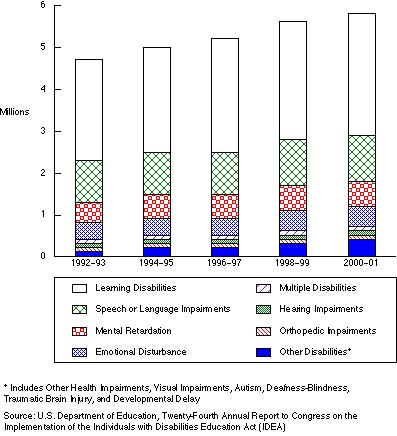Serving Households with Special Financial Needs MacroMonitor Marketing Report Vol. VI, No. 6 January 2004
The typical parent can reasonably expect plans to ensure the financial security of children to end when the children reach adulthood and achieve financial independence. But a parent with a special-needs child must provide for the child's lifetime care—a daunting financial and legal endeavor, not to forget a difficult and emotion-laden task that no parent ever looks forward to doing. Financial-services providers can do much to alleviate the stress that accompanies the planning that every parent with a special-needs child knows that he or she should do but has not yet done.
This underserved market is more than a "niche" market, and furthermore, it continues to grow. Some 49.7 million people age 5 and older have some type of disability, representing almost 20% of the 5-years-and-older civilian noninstitutionalized population, according to the Census 2000. About 17% of U.S. children younger than age 18 have a developmental disability, with approximately 2% having a serious developmental disability needing special-education services and supportive care, according to the National Center on Birth Defects and Developmental Disabilities.
Medical advances have extended the lives of children with special needs and the lives of aging adults in general. The MacroMonitor data showed that in 2002, more than one in ten U.S. households (roughly 12 million households) support infirm, aged, or handicapped adults—double the incidence in 1998. In addition, an estimated 2 million households anticipate undertaking this financial responsibility in the immediate future.
Few financial institutions have specific programs and specialized staff capable of meeting the financial needs of the special-needs population. Those that do not only gain the goodwill of the community but inevitably expand the market for their advice and planning services as well as their life-insurance and investment products. For an industry besieged by a procession of scandals and breaches of trust, meeting the needs of households with special-needs dependents not only has redeeming value but may even contribute to the institution's bottom line.
Children Ages 6 to 21 with Disabilities Served Under IDEA

This underserved market is more than a "niche" market, and furthermore, it continues to grow. Some 49.7 million people age 5 and older have some type of disability, representing almost 20% of the 5-years-and-older civilian noninstitutionalized population, according to the Census 2000. About 17% of U.S. children younger than age 18 have a developmental disability, with approximately 2% having a serious developmental disability needing special-education services and supportive care, according to the National Center on Birth Defects and Developmental Disabilities.
Medical advances have extended the lives of children with special needs and the lives of aging adults in general. The MacroMonitor data showed that in 2002, more than one in ten U.S. households (roughly 12 million households) support infirm, aged, or handicapped adults—double the incidence in 1998. In addition, an estimated 2 million households anticipate undertaking this financial responsibility in the immediate future.
Few financial institutions have specific programs and specialized staff capable of meeting the financial needs of the special-needs population. Those that do not only gain the goodwill of the community but inevitably expand the market for their advice and planning services as well as their life-insurance and investment products. For an industry besieged by a procession of scandals and breaches of trust, meeting the needs of households with special-needs dependents not only has redeeming value but may even contribute to the institution's bottom line.
